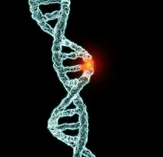 Hardly a week goes by without a surprise popping up in the world of cancer research. The understanding of how genetic mutations cause certain cancers continues to evolve, and this is radically changing how we view cancer, which could lead to a revolution in its treatment.
Hardly a week goes by without a surprise popping up in the world of cancer research. The understanding of how genetic mutations cause certain cancers continues to evolve, and this is radically changing how we view cancer, which could lead to a revolution in its treatment.
For example, should all leukemias be treated with leukemia drugs? Five years ago there was not much choice. But, back in February we discussed an article by Gina Kolata of The New York Times, which gave us a preview of an entirely new paradigm in cancer research. An elderly woman was extremely ill with a rare (and essentially untreatable) form of leukemia. But instead of trying another leukemia drug, her doctors gave her a melanoma drug. Her response was astounding.
Why give a patient who has leukemia a melanoma drug? You d have to be out of your mind, right?
Actually, it s quite the opposite. The genetic mutation that was responsible for the woman s cancer was the same one that causes at least certain melanomas, and this explains why the drug worked. A completely different way of looking at cancer.
It is important to note that the article was based on a single example, and this type of approach has failed far more than it has succeeded. But the the real story is the concept examining the genetics of the tumor rather than using a drug that has historically worked against a particular cancer in large populations. This is the essence of personalized medicine.
An article in the May 21st Wall Street Journal gives us another surprise courtesy of gene sequencing. It sounds crazy, but there appears to be a relationship between breast cancer in women and prostate cancer in men.
Dr. Charles Sawyers, the chairman of the Human Oncology and Pathogenesis Program at Sloan Kettering Cancer and colleagues reported in the journal Cell that when samples of tumors from men with late-stage prostate cancer were examined, 15 percent of them contained mutations in the n0w-famous (because of Angelina Jolie) BRCA1 or BRCA2 genes. (Despite the fact that the BRCA stands for breast cancer, men also carry these genes.)
Dr. Sawyers said, Prior to this no one would have entertained treating these patients with those drugs.
More importantly, the Sloan study demonstrated that 89 percent of these patients had known genetic mutations that could respond to other drugs that would have not have been used to treat prostate cancer. This is incredible.
ACSH s Dr. Josh Bloom cautions, These revolutionary concepts of how to view cancer are in their infancy. There will be some spectacular successes and almost certainly many more failures. The entire strategy could even end up being a dead end. It is way too early to predict how this plays out.
But, he adds, Medical breakthroughs do happen and the results can be spectacular. If someone was infected with HIV in 1985, they died. But if it was in 1995, there is a good chance they are still alive. No one in 1985 would have predicted that people who were HIV-positive would, 30 years later, have a nearly normal life span. Unfortunately, many died during the time this research was being done, and the same will certainly be true in this case. This is the nature of biomedical research. Breakthroughs are nearly impossible to anticipate.


